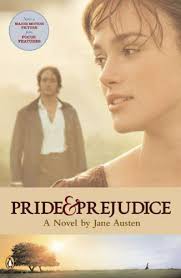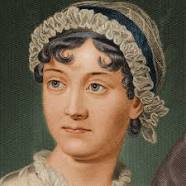Pride and Prejudice Page #22
Pride and Prejudice is a romantic novel by Jane Austen, first published in 1813. The story charts the emotional development of the protagonist, Elizabeth Bennet, who learns the error of making hasty judgments and comes to appreciate the difference between the superficial and the essential. The comedy of the writing lies in the depiction of manners, education, marriage, and money during the British Regency period.
The prospect of the Netherfield ball was extremely agreeable to every female of the family. Mrs. Bennet chose to consider it as given in compliment to her eldest daughter, and was particularly flattered by receiving the invitation from Mr. Bingley himself, instead of a ceremonious card. Jane pictured to herself a happy evening in the society of her two friends, and the attentions of their brother; and Elizabeth thought with pleasure of dancing a great deal with Mr. Wickham, and of seeing a confirmation of everything in Mr. Darcy's look and behaviour. The happiness anticipated by Catherine and Lydia depended less on any single event, or any particular person, for though they each, like Elizabeth, meant to dance half the evening with Mr. Wickham, he was by no means the only partner who could satisfy them, and a ball was, at any rate, a ball. And even Mary could assure her family that she had no disinclination for it. “While I can have my mornings to myself,” said she, “it is enough--I think it is no sacrifice to join occasionally in evening engagements. Society has claims on us all; and I profess myself one of those who consider intervals of recreation and amusement as desirable for everybody.” Elizabeth's spirits were so high on this occasion, that though she did not often speak unnecessarily to Mr. Collins, she could not help asking him whether he intended to accept Mr. Bingley's invitation, and if he did, whether he would think it proper to join in the evening's amusement; and she was rather surprised to find that he entertained no scruple whatever on that head, and was very far from dreading a rebuke either from the Archbishop, or Lady Catherine de Bourgh, by venturing to dance. “I am by no means of the opinion, I assure you,” said he, “that a ball of this kind, given by a young man of character, to respectable people, can have any evil tendency; and I am so far from objecting to dancing myself, that I shall hope to be honoured with the hands of all my fair cousins in the course of the evening; and I take this opportunity of soliciting yours, Miss Elizabeth, for the two first dances especially, a preference which I trust my cousin Jane will attribute to the right cause, and not to any disrespect for her.” Elizabeth felt herself completely taken in. She had fully proposed being engaged by Mr. Wickham for those very dances; and to have Mr. Collins instead! her liveliness had never been worse timed. There was no help for it, however. Mr. Wickham's happiness and her own were perforce delayed a little longer, and Mr. Collins's proposal accepted with as good a grace as she could. She was not the better pleased with his gallantry from the idea it suggested of something more. It now first struck her, that she was selected from among her sisters as worthy of being mistress of Hunsford Parsonage, and of assisting to form a quadrille table at Rosings, in the absence of more eligible visitors. The idea soon reached to conviction, as she observed his increasing civilities toward herself, and heard his frequent attempt at a compliment on her wit and vivacity; and though more astonished than gratified herself by this effect of her charms, it was not long before her mother gave her to understand that the probability of their marriage was extremely agreeable to her. Elizabeth, however, did not choose to take the hint, being well aware that a serious dispute must be the consequence of any reply. Mr. Collins might never make the offer, and till he did, it was useless to quarrel about him. If there had not been a Netherfield ball to prepare for and talk of, the younger Miss Bennets would have been in a very pitiable state at this time, for from the day of the invitation, to the day of the ball, there was such a succession of rain as prevented their walking to Meryton once. No aunt, no officers, no news could be sought after--the very shoe-roses for Netherfield were got by proxy. Even Elizabeth might have found some trial of her patience in weather which totally suspended the improvement of her acquaintance with Mr. Wickham; and nothing less than a dance on Tuesday, could have made such a Friday, Saturday, Sunday, and Monday endurable to Kitty and Lydia. Chapter 18 Till Elizabeth entered the drawing-room at Netherfield, and looked in vain for Mr. Wickham among the cluster of red coats there assembled, a doubt of his being present had never occurred to her. The certainty of meeting him had not been checked by any of those recollections that might not unreasonably have alarmed her. She had dressed with more than usual care, and prepared in the highest spirits for the conquest of all that remained unsubdued of his heart, trusting that it was not more than might be won in the course of the evening. But in an instant arose the dreadful suspicion of his being purposely omitted for Mr. Darcy's pleasure in the Bingleys' invitation to the officers; and though this was not exactly the case, the absolute fact of his absence was pronounced by his friend Denny, to whom Lydia eagerly applied, and who told them that Wickham had been obliged to go to town on business the day before, and was not yet returned; adding, with a significant smile, “I do not imagine his business would have called him away just now, if he had not wanted to avoid a certain gentleman here.” This part of his intelligence, though unheard by Lydia, was caught by Elizabeth, and, as it assured her that Darcy was not less answerable for Wickham's absence than if her first surmise had been just, every feeling of displeasure against the former was so sharpened by immediate disappointment, that she could hardly reply with tolerable civility to the polite inquiries which he directly afterwards approached to make. Attendance, forbearance, patience with Darcy, was injury to Wickham. She was resolved against any sort of conversation with him, and turned away with a degree of ill-humour which she could not wholly surmount even in speaking to Mr. Bingley, whose blind partiality provoked her. But Elizabeth was not formed for ill-humour; and though every prospect of her own was destroyed for the evening, it could not dwell long on her spirits; and having told all her griefs to Charlotte Lucas, whom she had not seen for a week, she was soon able to make a voluntary transition to the oddities of her cousin, and to point him out to her particular notice. The first two dances, however, brought a return of distress; they were dances of mortification. Mr. Collins, awkward and solemn, apologising instead of attending, and often moving wrong without being aware of it, gave her all the shame and misery which a disagreeable partner for a couple of dances can give. The moment of her release from him was ecstasy.
Translation
Translate and read this book in other languages:
Select another language:
- - Select -
- 简体中文 (Chinese - Simplified)
- 繁體中文 (Chinese - Traditional)
- Español (Spanish)
- Esperanto (Esperanto)
- 日本語 (Japanese)
- Português (Portuguese)
- Deutsch (German)
- العربية (Arabic)
- Français (French)
- Русский (Russian)
- ಕನ್ನಡ (Kannada)
- 한국어 (Korean)
- עברית (Hebrew)
- Gaeilge (Irish)
- Українська (Ukrainian)
- اردو (Urdu)
- Magyar (Hungarian)
- मानक हिन्दी (Hindi)
- Indonesia (Indonesian)
- Italiano (Italian)
- தமிழ் (Tamil)
- Türkçe (Turkish)
- తెలుగు (Telugu)
- ภาษาไทย (Thai)
- Tiếng Việt (Vietnamese)
- Čeština (Czech)
- Polski (Polish)
- Bahasa Indonesia (Indonesian)
- Românește (Romanian)
- Nederlands (Dutch)
- Ελληνικά (Greek)
- Latinum (Latin)
- Svenska (Swedish)
- Dansk (Danish)
- Suomi (Finnish)
- فارسی (Persian)
- ייִדיש (Yiddish)
- հայերեն (Armenian)
- Norsk (Norwegian)
- English (English)
Citation
Use the citation below to add this book to your bibliography:
Style:MLAChicagoAPA
"Pride and Prejudice Books." Literature.com. STANDS4 LLC, 2025. Web. 11 Jan. 2025. <https://www.literature.com/book/pride_and_prejudice_9>.




Discuss this Pride and Prejudice book with the community:
Report Comment
We're doing our best to make sure our content is useful, accurate and safe.
If by any chance you spot an inappropriate comment while navigating through our website please use this form to let us know, and we'll take care of it shortly.
Attachment
You need to be logged in to favorite.
Log In